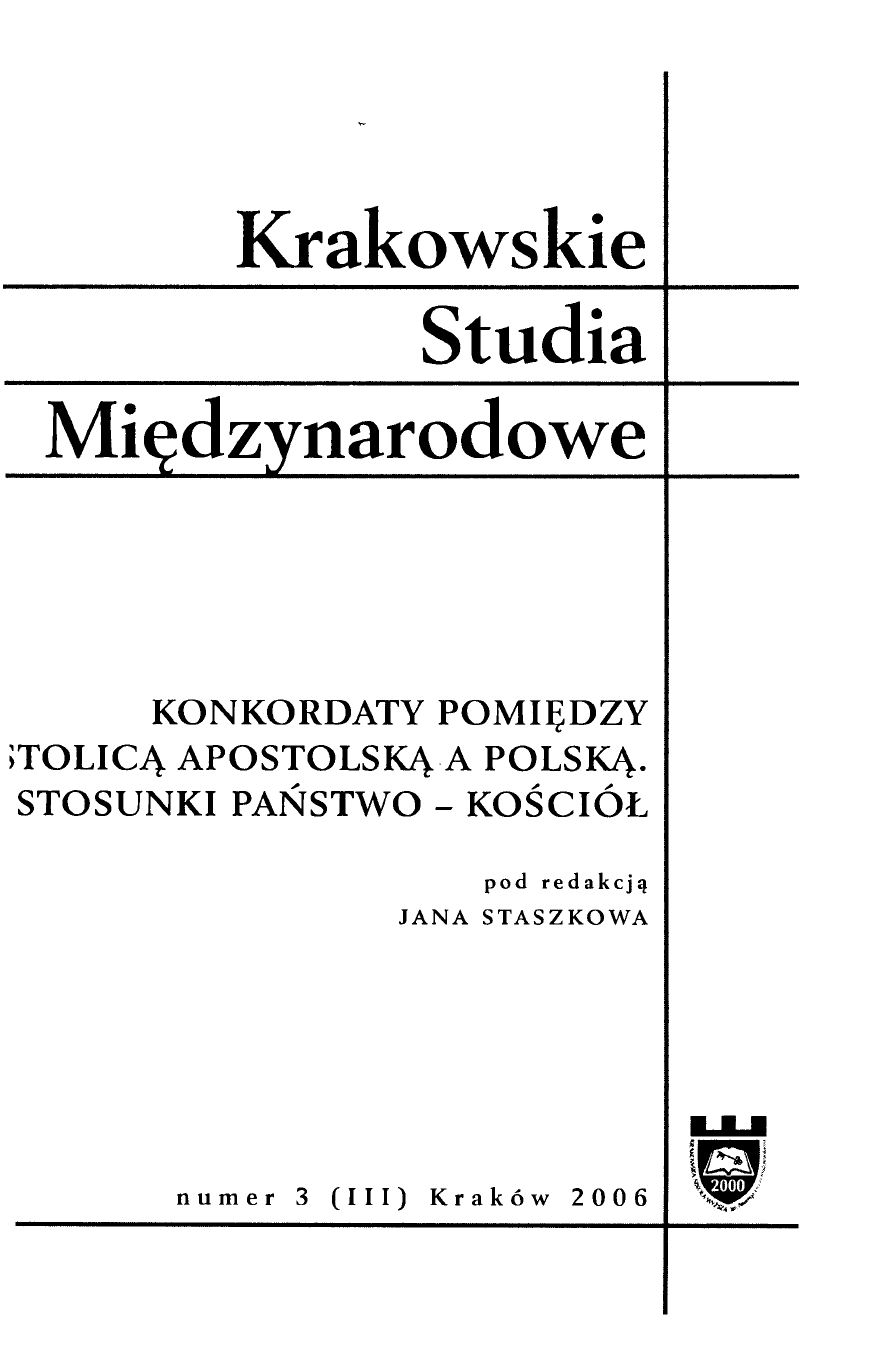
We kindly inform you that, as long as the subject affiliation of our 300.000+ articles is in progress, you might get unsufficient or no results on your third level or second level search. In this case, please broaden your search criteria.

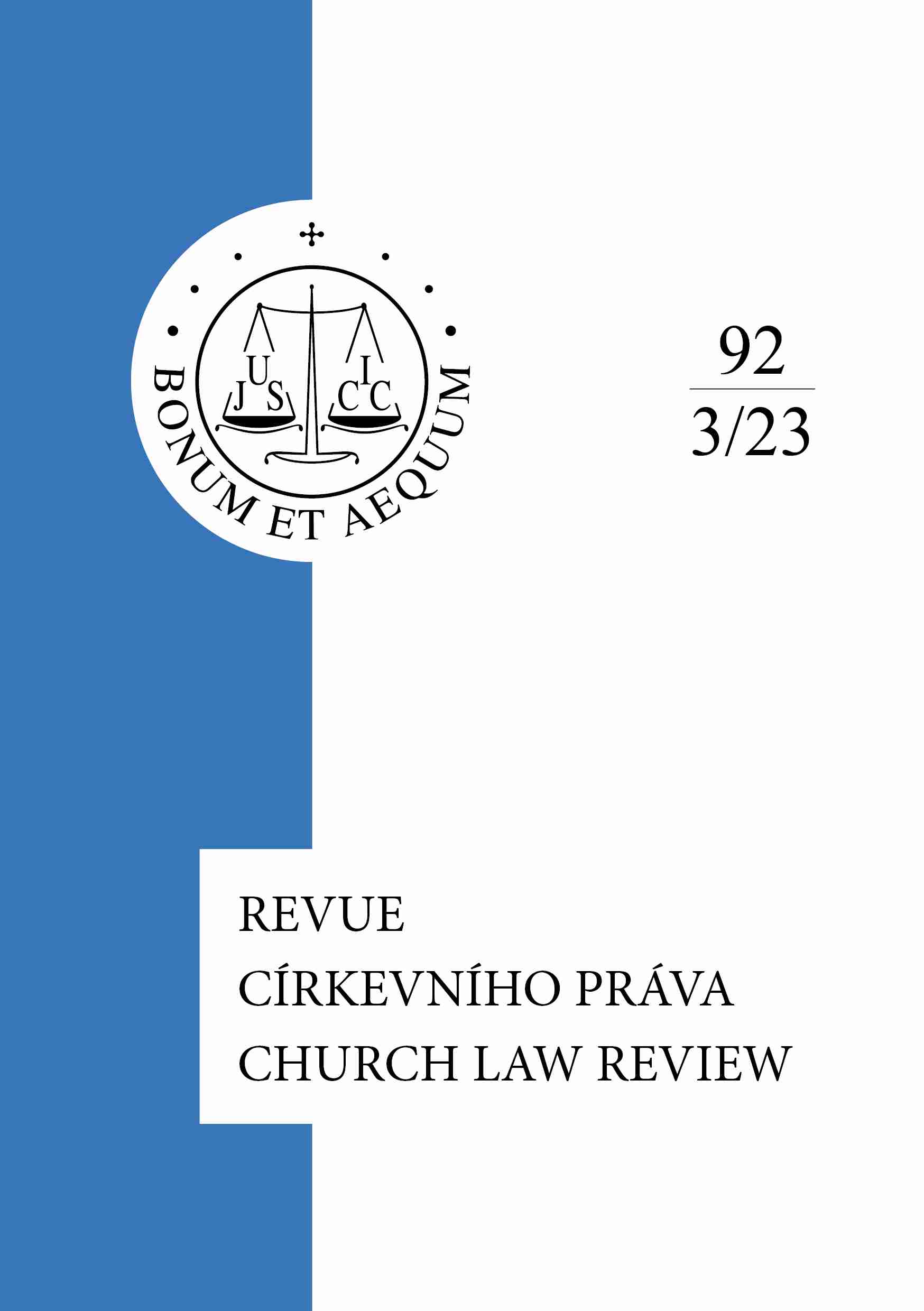
The sources of law may be denoted to be one of the most important sources of information not only for lawyers, legal historians, but also other scientists. They do not reflect social development only in the legal sphere, since their norms directly and authoritatively affect many areas of social life. Passing of a new rule, its change or abrogation of the older one then leads to the eventuality of deduction of actual social needs in then period of the development of given society. This statement is all the more valid for the legal system of the Catholic Church, since canon law influenced the development of mankind for the whole centuries in determinative way. However, the contemporary science, not only legal, on the ground of several reasons (of subjective character typically) often neglects these precious sources of information while doing research activities. The main goal of the article is to point out the importance of sources of canon law and their constant topicality not only for the canonists and legal historians, but even scientists from other scientific branches.
More...
This article looks at the amendments of the current Code of Canon Law in terms of their theological justification. It establishes that most of the theological focus is to be found in the first two amendments, over which Josef Ratzinger had considerable influence, in the first instance while still a cardinal in the case of John Paul II’s amendment Ad tuendam fidem, then as pope for the amendment Omnium in mentem. In this amendment, the German-born pope also dealt with the question of formal apostasy from the Catholic Church, a topical issue in his native country. There is also no lack of theological justification in the amendments made by Pope Francis, particularly on matrimonial procedure, issued in the form of two motu proprio, and in the comprehensive amendment to criminal law Pascite gregem Dei, promulgated in the form of an apostolic constitution. The latter specifies the criminal sanction for many offences, including the offence of denying definitively proclaimed Church doctrine, which was first introduced by the amendment Ad tuendam fidem.
More...
The article deals with the development of the criminal law of the Church after the publication of the Code of Canon Law in 1983. It reflects on the reasons for the emergence of new criminal offences. It traces the emergence and development of extra-canonical norms, the evolution of the definition of particularly serious crimes by the Congregation for the Doctrine of the Faith and the subsequent incorporation of the newly created norms into the amendment of Book VI of the Code. It shows the new arrangement of the matter of criminal law in the amendment of Book VI of the Code and the intentions of the legislator.
More...
This article presents one sub-area of the penal law of the Latin Catholic Church, amended in 2021 in a radical way: by replacing the entire existing Book 6 of the 1983 Code of Canon Law with a new text in 2021. Significant changes have been made, especially in the area of expiatory penalties. The first chapter gives a brief description of the four legislative texts regarding expiatory penalties since the beginning of the 20th century: the 1917 Code of Canon Law, the original 1983 version of the Code of Canon Law, the comprehensive draft of the amended 6th Book of the Code sent for comments in 2011, and the final amended text promulgated in 2021. The second chapter uses the method of comparison to show the legislative development of the individual expiatory penalties currently in force. The third and fourth chapters present the penalties that were not taken over from the earlier normative regulations into the amendment of 2021: due to the vastness of the matter in the third chapter, the penalties not taken over from the 1917 Code of Canon Law, and in the fourth chapter the penalties not taken over from the original text of the 1983 Code of Canon Law and the 2011 comprehensive draft. The author also provides the theological context of some of the new legal regulations.
More...
The first Christians celebrated marriage according to the laws and customs of the nation that they belonged to, only without the elements that may have been part of a pagan cult. They soon began to think about marriage in a theological way as well and began to add liturgical elements to the celebration of marriage. Gradually, norms emerged that prescribed Catholic Christians to marry in church. Entering into a marriage outside the sacred space was considered a rather undesirable exception. Today, however, more and more Catholic Christians wish, for various reasons, to celebrate marriage outside the sacred space. The article deals with this issue and attempts to outline the criteria for the appropriateness of such a chose.
More...
One of the special conditions that in retrospect proved to be decisive for the formation of Western industrial society is the emergence of the unique occidental urban culture. The guilds as "communes pré-légales" formed the nucleus for this. Without them, the social type of the free and equal citizen, who is loyal to his community, is inconceivable. As "groupements pré-urbains", they brought the forms and spirit of fraternity by oath to the emerging cities. As "initiatrices de l'autonomie urbaine" they secured political and commercial self-government in the city and territory vis-à-vis the authorities. In the view of Max Weber, the uniqueness of the occidental city is correspondingly linked to the associational character that occurred there, and also Otto Hintze pointed out that the European development into a free community was a singular phenomenon that had not occurred in this form anywhere else. Although there were guilds and similar associations of persons in the East, for example in China, the decisive difference to the European groups lay in the fact that the former remained connected to the idea of family, clan and tribal. While the dynastic rule regularly established a vertically structured organization, the "artificial kinship" resulted in a horizontal formation, which was established as a free "union" between the participants by contract and oath was characterized by certain principles. The constitutive feature was the oath that was linked to the treaty and indissolubly bound the "confederates" („Eidgenossen“) to each other. In examining the organizing principles of these "unifications", four areas must be emphasized: 1. The unconditional obligation to assist each other ("against all and everyone"). 2. The professional, social and (or) pastoral support of its members. 3. The primacy of one's own legal system. 4. The order of the Community by law and procedure. The Swiss "Eid-Genossenschaft" of 1291, which, apart from the free imperial cities of the Holy Roman Empire, was the only horizontal association to assert itself at the state level, and still proudly bears this designation today, is a prominent example of the constitutive and at the same time hardened by the oath an association of this form.
More...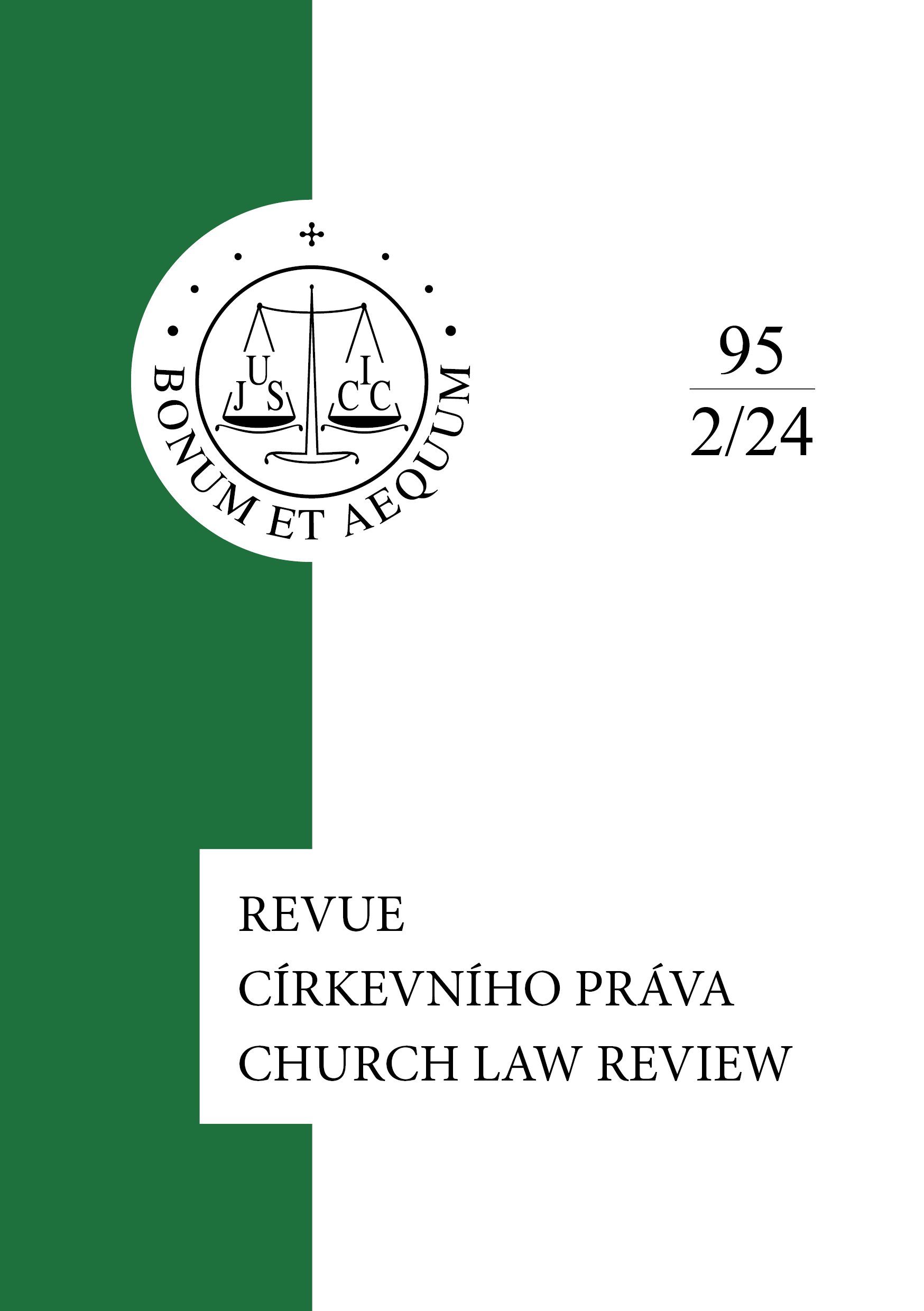
The article correlates the sinful acts against the Sixth Commandment of the Decalogue and the canonical norms that can be affected by such conduct and thus produce the relevant legal consequences. First, the article places the Sixth Commandment within the overall context of the Decalogue, in order to then show how sinful and deviant sexual conduct can endanger marital cohabitation, which is thus affected by the psychological inability to accept and fulfil the obligations of marriage. These serious defects in marital consent can be grounds for declaring the nullity of a marriage from the beginning. Infidelity itself is one of the possible grounds for separation of spouses under the existing marital bond. In the administration of the sacrament of penance, there may be the offence of absolution of a penitent who is guilty of sin against the Sixth Commandment as well as the offence of incitement to sin against the Sixth Commandment. The sexual abuse of minors by clerics has gradually led to a tightening of criminal penalties. This legislative process culminated in 2021 with the apostolic constitution Pascite gregem Dei, which represents a comprehensive amendment of the entire code criminal law.
More...
Canon law is an integral part of the Church’s life, and it has two dimensions: individual and social. The effects of declaring a marriage null highlight this characteristic of the law, as it significantly impacts both the religious life of the individuals involved and the wider community of the faithful. This article presents research results on individuals who have participated in this process, which demonstrate that canon law plays a crucial role in resolving many individual and collective issues within the Church.
More...
The article discusses the current situation regarding the possibility of conferring the sacrament of ordination on women at the level of priest and bishop. It first of all outlines the issue from the point of view of dogmatic theology, then maps out the legal consequences within the ecclesiastical discipline, specifically in the law of sanction and magisterial law. In the article the author comes to the conclusion that the inability of a woman to receive ordination needs to be considered a closed question and a definitive truth, which the Pope has proclaimed as a use of the charism of infallibility. This implies both the impossibility of conferring ordination and also the impossibility of denying or relativising this doctrine in the teaching of theological faculties and seminaries.
More...
The 13th International Ecumenical Legal Conference held in Brenna, Poland, on April 24-25, 2024, was organized by the Faculty of Theology at the University of Silesia in Katowice, in collaboration with several other institutions. The conference focused on the theme "The Laity in the Church: Communion, Participation, Mission." The event featured presentations from experts in philosophy, canon law, theology, and law, discussing topics such as the role of laypeople in the synodal vision of the Church, the dignity of the human person, and the relationship between general priesthood and office among Lutherans. The conference also addressed the current state and perspectives of laypeople in church governance and the role of lay theologians in the modern world. Despite some participants being absent due to illness, the conference concluded with a discussion and a communal meal. Contributions from the conference will be published in the journal "Ecumeny and Law."
More...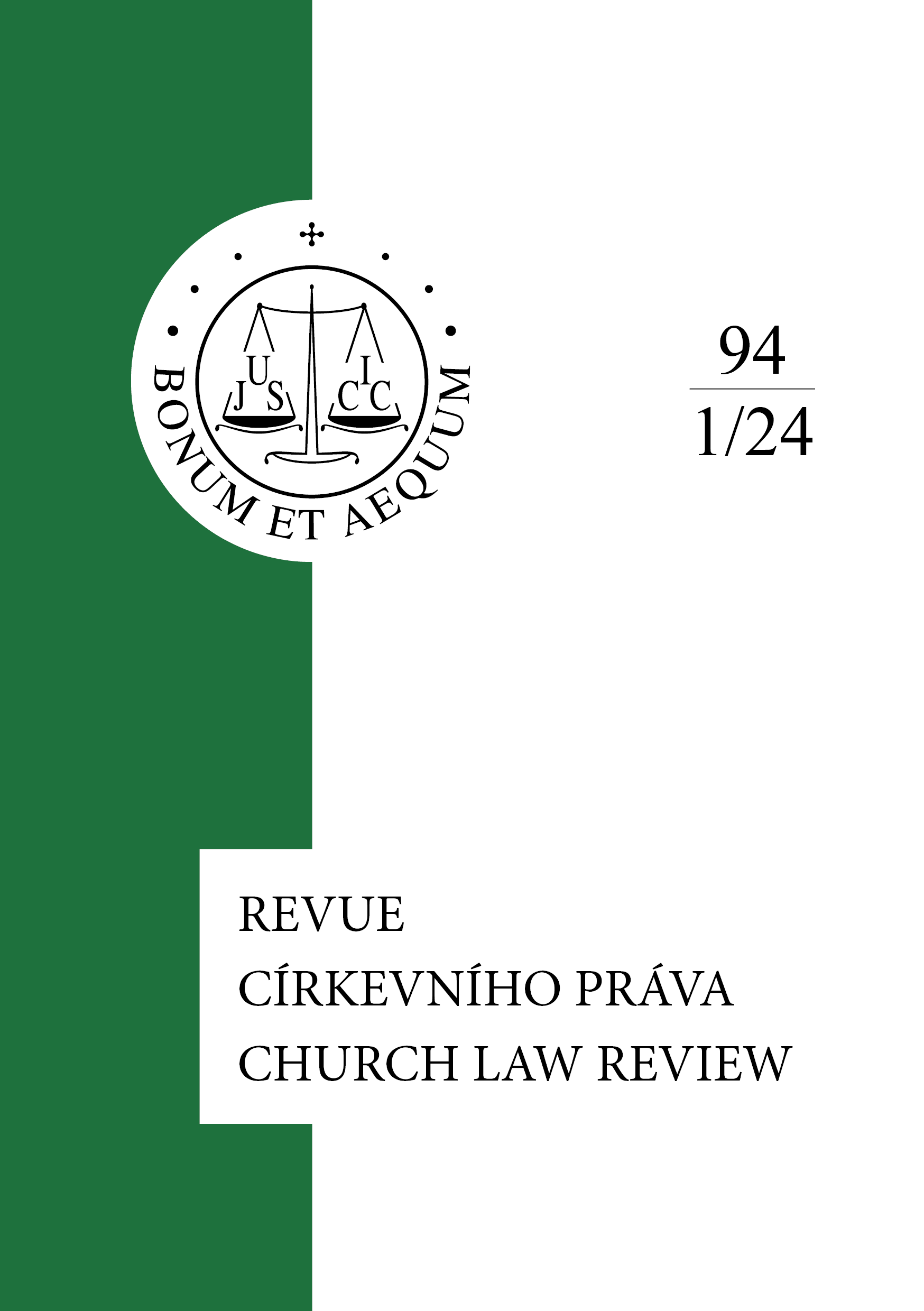
The article focuses on the change in Church legislation during the pontificates of the last two popes, Benedict XVI (motu proprio Omnium in mentem) and Francis (Spiritus Domini, Antiquum ministerium), concerning the status of deacons and lay ministries of acolyte, lector and catechist. It shows a shift from the preconciliar perception of the laity to a contemporary agreement of their own charismata in certain ministries in the Church. It also outlines the particular regulations of the Czech Bishops' Conference for these areas of lay ministry.
More...
The article describes the possibility of establishing ecclesiastical administrative courts at the level of local churches, especially episcopal conferences, with a focus on the situation in the Czech Republic. The content of the text is limited to the Code of the Latin Church. The article first introduces the project of local administrative courts in the preparatory work for the CIC/1983, which envisaged a parallel choice between hierarchical recourse and administrative action before an administrative court. The Latin Code was then promulgated without norms governing administrative justice. In CIC/1983, only two provisions are devoted to administrative courts, namely can. 149 § 2 and 1400 § 2. Next, the text briefly introduces the administrative hierarchical recourse under cann. 1732–1739 CIC and presents three ways in which local administrative courts could be established. Finally, the article presents some practical objections to the establishment of local administrative courts and offers an optimal solution for the Church in the Czech Republic.
More...
The Fifth International Symposium on Canon Law was held at the Spiritual Center of St. Francis of Paola in Vranov u Brna from September 17-20, 2023. Over 150 canonists, including judges, lawyers, notaries, and other church court officials from the Czech Republic and Slovakia, attended the event. The symposium focused on criminal substantive and procedural canon law, featuring presentations by leading canonists from the Apostolic See and Italian dioceses. Key topics included the principles of the new criminal law of the Catholic Church, preliminary investigations, and administrative penal proceedings. The event also included group work sessions where participants discussed specific cases. The symposium concluded with a series of lectures on the judicial process in criminal cases and the drafting of defenses in cases of marriage nullity and criminal cases. The event was organized by the Academy of Canon Law in Brno under the leadership of Mons. Karel Orlita.
More...
The Fifth International Symposium on Canon Law, held at the Spiritual Center of St. Francis of Paola in Vranov u Brna from September 17-20, 2023, organized by the Academy of Canon Law in Brno, the symposium attracted over 150 participants, including judges, lawyers, notaries, and other church court officials from the Czech Republic and Slovakia. The event focused on criminal substantive and procedural canon law, with presentations by leading canonists from the Apostolic See and Italian dioceses. Key topics included the principles of the new criminal law of the Catholic Church, preliminary investigations, and administrative penal proceedings. The symposium also featured group work sessions where participants discussed specific cases. The event concluded with lectures on the judicial process in criminal cases and the drafting of defenses in cases of marriage nullity and criminal cases. The symposium emphasized the practical application of new canonical norms and the importance of ongoing education for church court officials.
More...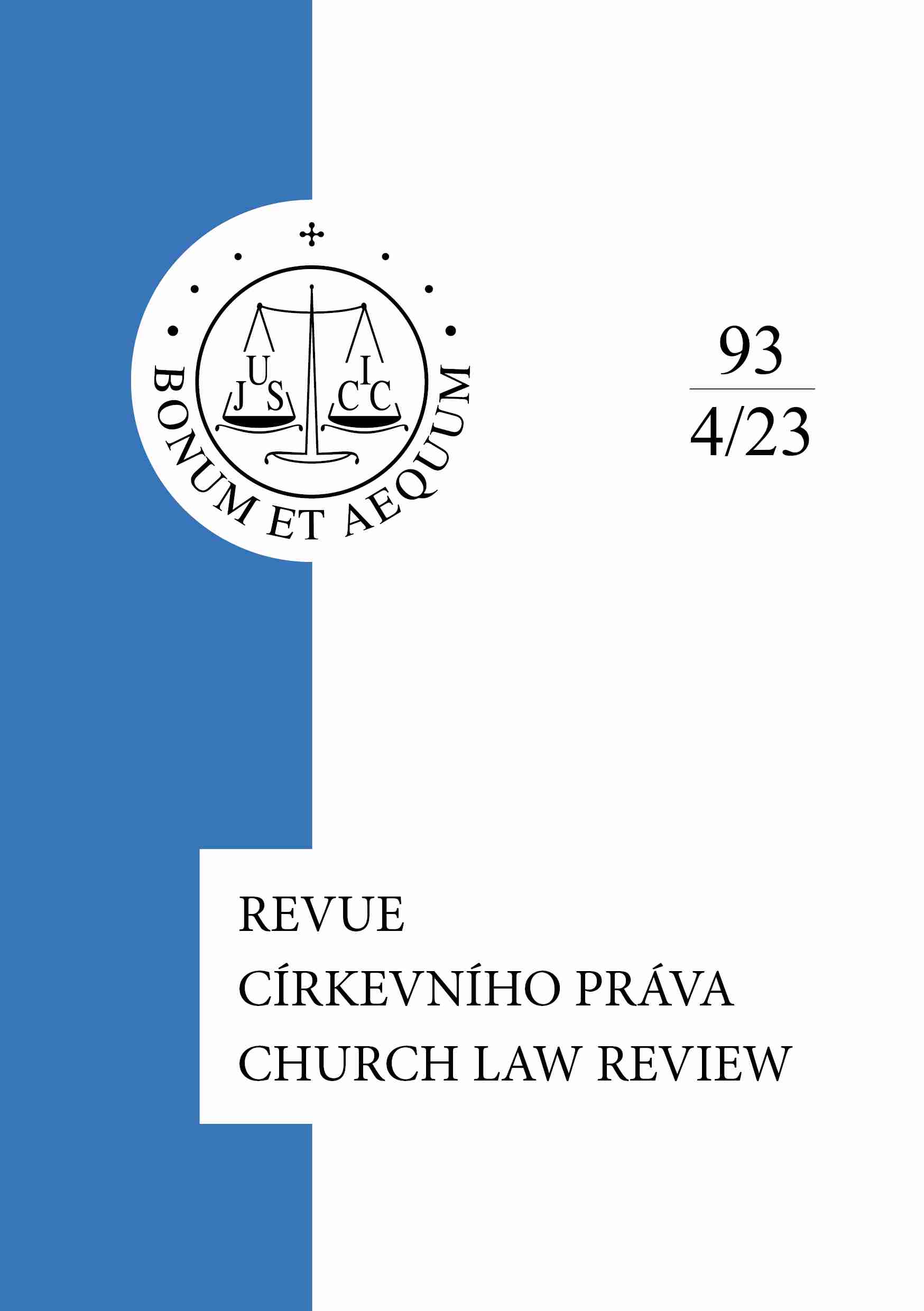
The 29th annual conference "Church and State," was held on September 7, 2023, at the Faculty of Law, Masaryk University in Brno, organized by the Department of Constitutional Law and Political Science and the Society for Church Law. The conference aimed to discuss the history and current development of canonical and confessional law. The event featured presentations on new criminal law in the Catholic Church, reserved delicts, and modifications of automatic dismissal from religious institutes. Key speakers included Dr. Bartoloměj Čačík, Prof. Damián Němec OP, and Dr. Šimon Polívka. The conference also addressed the legal status of unborn human life and changes in Eastern Catholic Church law. The final session focused on the concept of conscientious objection in legal practice. The conference concluded with a lively discussion on the terminology of pregnancy termination and its legal implications.
More...
The annual conference and general meeting of the Society of Polish Canonists, held from September 4-6, 2023, in Miejsce Piastowe, Poland focused on the cooperation between the State and the Church in respecting marriage and family institutions, marking the 40th anniversary of the Charter of Rights of the Family and the 30th anniversary of the concordat between the Apostolic See and Poland. Lectures covered topics such as family rights in CIC 1983, cooperation in procedural law, and the relationship between marriage nullity actions and the parties' right of defense. The event featured presentations by prominent scholars and included discussions on various aspects of family and marriage law. The conference also included a solemn Mass and a tour of local educational facilities. The Society of Polish Canonists, with over 830 members, continues to publish the periodical Biuletyn Stowarzyszenia Kanonistów Polskich.
More...
The international conference "Contemporary State-Church Law – Comparative and National Perspectives," held in Budva, Montenegro, from October 12-14, 2023 was organized by the Metropolitanate of Montenegro and the Littoral of the Serbian Orthodox Church and the Institute of Comparative Law in Belgrade. The conference attracted around 70 participants worldwide. Discussions focused on various sociological, political, and historical aspects of state-church relations, including church self-governance, analysis of ecclesiastical norms, and state regulations affecting religious communities. The event featured notable speakers such as Prof. Silvio Ferrari, Prof. Gerhard Robbers, Prof. Elizabeth Clark, and Prof. Alarico Barbagli. The conference included a solemn liturgy at the Podmaine Monastery and concluded with an excursion to the Podlastva Monastery. The high-level organization and extensive media coverage underscored the event's significance, with proceedings to be published in a forthcoming collection.
More...
The conference "Inter Concilium et Synodum," held in Lublin on October 18, 2023, to mark the 40th anniversary of the promulgation of the 1983 Code of Canon Law. Organized by the Department of History, General Norms, Sacramental Law, and Institutes of Consecrated Life at the Catholic University of Lublin, the conference gathered around 50 canonists and theologians from Poland, the Czech Republic, and Germany, including a representative from the Apostolic See. The event focused on the theme of synodality, currently a key topic in the XVI Ordinary General Assembly of the Synod of Bishops in Rome. Presentations covered various aspects of synodality, from its historical development to evaluations of the German Synodal Path. Key speakers included Aleksandra Brzemia-Bonarek, Lidia Fiejdasz Buczek, and Elżbieta Szczot, who moderated the sessions. The conference also featured discussions on the role of church advocates, the institution of the Synod of Bishops, and the development of consecrated life law. The event concluded with a reflection on the significance of synodality in the contemporary Catholic Church.
More...
The 10th International Conference on Philosophy and Canon Law held in Prešov from November 10-11, 2023, organized by the Greek Catholic Theological Faculty of Prešov University and the Theological Faculty of the Silesian University in Katowice, focused on "The Living Temple of God" and Joseph Ratzinger's prophetic testimony about the Church. The first day covered various philosophical topics, highlighting the inseparability of philosophy, theology, and the life of the Catholic Church in Ratzinger's thought. Discussions included the significance of Benedict XVI's exhortations, the connection between liturgy and life, and the pastoral importance of his messages. The second day centered on canon law, examining Ratzinger's documents related to canonical law and their impact on civil law. The conference emphasized the depth and coherence of Benedict XVI's ecclesiological thought and its influence on disciplinary measures. The event concluded with reflections on the relationship between liturgy and canon law, and the broader implications of Benedict's critique of secular law.
More...